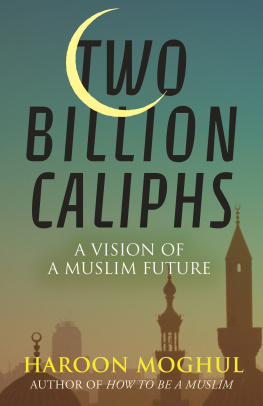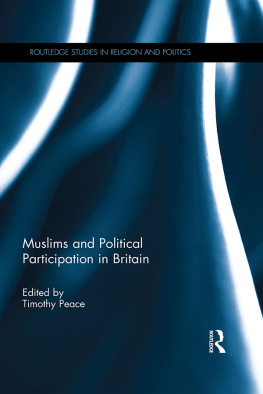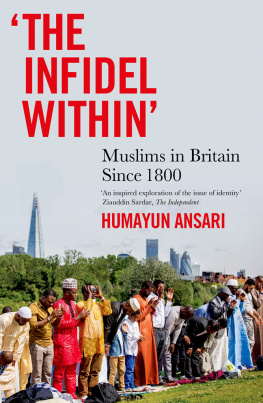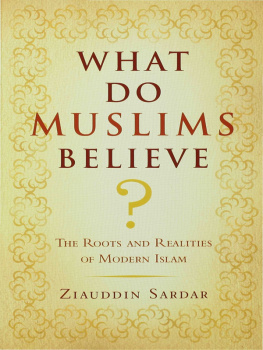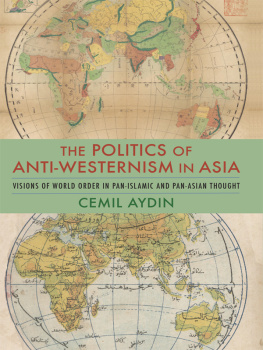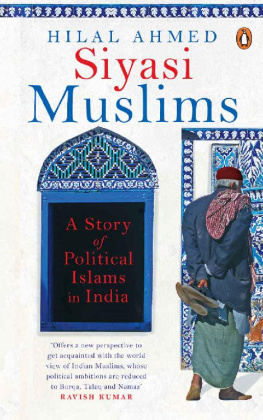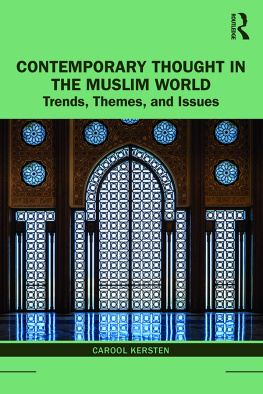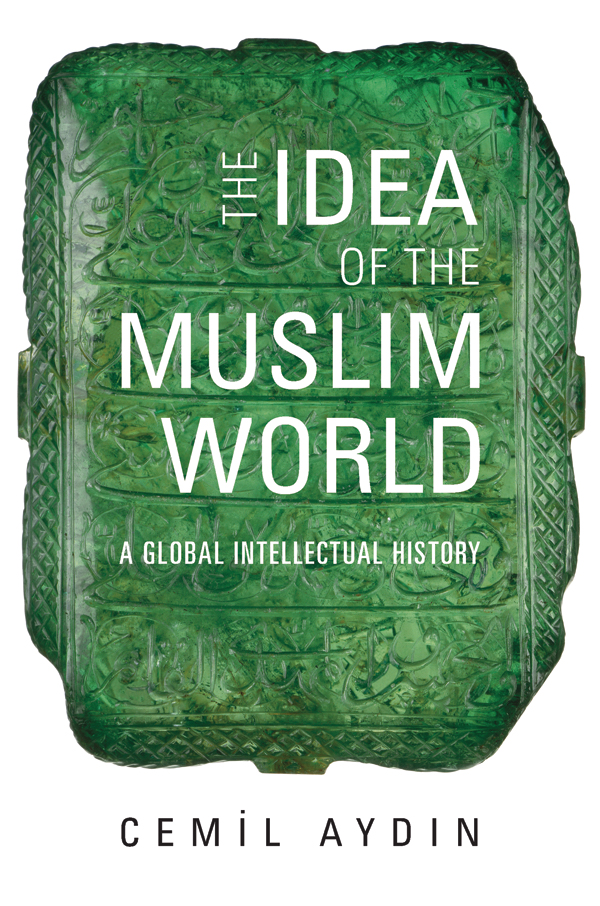Contents
Guide
Pagebreaks of the print version
The Idea of the Muslim World
A Global Intellectual History
CEMIL AYDIN

Cambridge, Massachusetts, & London, England
2017
Copyright 2017 by the President and Fellows of Harvard College
All rights reserved
Jacket image: The Mughal Emerald, 16951696 (emerald), Mughal School, (17th century)/Private Collection/Photo Christies Images/Bridgeman Images
Jacket design: Jill Breitbarth
978-0-674-05037-2 (hardcover : alk. paper)
978-0-674-97738-9 (EPUB)
978-0-674-97739-6 (MOBI)
978-0-674-97740-2 (PDF)
The Library of Congress has cataloged the printed edition as follows:
Names: Aydin, Cemil, author.
Title: The idea of the Muslim world : a global intellectual history / Cemil Aydin.
Description: Cambridge, Massachusetts : Harvard University Press, 2017. | Includes bibliographical references and index.
Identifiers: LCCN 2016046007
Subjects: LCSH: MuslimsPublic opinionHistory. | Group identityIslamic countriesHistory. | Islamic countriesCivilization. | Islamic countriesCivilizationWestern influences.
Classification: LCC BP52 .A94 2017 | DDC 909/.09767dc23
LC record available at https://lccn.loc.gov/2016046007
For Juliane, Leyla, and Mehtap
Contents
Roughly a fifth of people now living are Muslims. Their societies, located in every corner of the globe, vary in language, ethnicity, political ideology, nationality, culture, and wealth. Yet throughout modern history, Muslims and non-Muslims have appealed to an imagined global Muslim unity. One need only look at the headlines to see that this unity does not exist: today, the very people who claim to speak on behalf of all Muslims target other Muslims as their enemies; Muslim societies are more divided than ever, riven by civil wars and protracted conflicts across borders. Even so, the illusion of Muslim unity persists.
This illusion is captured most succinctly in the universally popular notion of a Muslim world, with its own collective history and future, often contrasted with a putative West. But we rarely question the historical roots and conceptual shortcuts inherent in such terms. Since when do political leaders, intellectuals, and everyday people talk about a Muslim world? How has it encompassed a civilization, religious tradition, and geopolitical unit? Why are the same people who take for granted the existence of a Muslim world reluctant to talk about a Christian world, an African world, or a Buddhist world in the same way? Why has the idea of the Muslim world become so entrenched, despite the obvious navet of categorizing one and a half billion people, in all their diversity, as an imagined unity?
When President Barack Obama made his 2009 address to the Muslim world in Cairo, he was confirming the modern assumption that there is a global Muslim community to be engaged. Obama was trying to undo the damage President George W. Bushs war on terror had done to Americas image among Muslims. To that end, Obama praised the historical contributions of Muslims in areas such as algebra, medicine, navigation, and printing. He also criticized Americans negative stereotypes about Muslim faith traditions. He mentioned the positive moral values of these traditions and lauded American Muslims. This was a kind of sweetener before he put forward his governments views about the political tensions between the United States and diverse Muslim societies. It was an odd gesture. Would it be acceptable, or even sensible, to appeal to the contributions of East Asian civilization, Buddhism, and Confucianism before addressing Americas political disputes with China?
Alongside Obama and so many others in the so-called West, Muslim leaders and intellectuals rely on the notion of the Muslim world to describe, simultaneously, the geopolitics, civilization, and religious tradition of diverse millions. About two decades before President Obamas speech, in January 1988, Irans Ayatollah Ruhollah Khomeini wrote a letter to Mikhail Gorbachev on behalf of the Muslim world, urging the Soviet leader not to be misled by the capitalist West and to study the spiritual and political values of Islam. Khomeini ended his letter by declaring, The Islamic Republic of Iran, as the greatest and most powerful base of the Islamic world, can easily fill the vacuum of religious faith in your society. How did we arrive at this point, where a fantastical entity could be so present, so prevalent in political thinking? Why do so many Muslim and non-Muslim political leaders, intellectuals, and religious figures comfortably base many of their arguments and decisions on the idea of the Muslim World without reflecting on the accuracy of the generalization that this term signifies?
Contrary to widespread assumption, the term Muslim world does not derive from ummah, a concept as old as Islam, which refers to the Muslim religious community. Instead the idea of the Muslim world began to develop in the nineteenth century and achieved full flower in the 1870s. Also mistaken is the belief that Muslims were united until nationalist ideology and European colonialism tore them apart. This is precisely backward; in fact, Muslims did not imagine belonging to a global political unity until the peak of European hegemony in the late nineteenth century, when poor colonial conditions, European discourses of Muslim racial inferiority, and Muslims theories of their own apparent decline nurtured the first arguments for pan-Islamic solidarity. In other words, the Muslim world arrived with imperial globalization and its concomitant ordering of humanity by race. The racialization of Islam was bound up with its transformation into a universal and uniform religious tradition, a force in international politics, and a distinct object in a discourse of civilizations. Political strategy and intellectual labor made this new reality, and both Muslims and European Christians took part.
The eve of World War I was the high point of perceived global Muslim unity. In the fall of 1914, the sultan of the Ottoman Empire drew on the authority he had cultivated as caliph of the global Muslim community to declare jihad on behalf of the Muslim world. Yet even then there were strong expressions of Muslim loyalty to the Ottomans enemies: the British, French, Dutch, and Russian empires. Competing Muslim and non-Muslim conceptions of the Muslim world wrought dramatic changes over the next decade. The abolition of the Ottoman caliphate in 1924 inspired self-reflection and debate on Muslim-world identity in an era when modernizing ideologies of nationalism and bolshevism threatened to obviate other political forms.
During World War II, the notion of the Muslim world remained a centerpiece of imperial propaganda, as both Axis and Allies sought Muslims support. But afterward, at the peak of decolonization during the 1950s and the 1960s, the Muslim world receded. No successor rose to anchor the Muslim world, as the Ottomans had. Indian independence and the messy partition of Pakistan sapped the influence of Indian Muslims, who, for a century, had been able to sway global affairs by pressuring and cajoling their British overlords. In this period, few journalists and scholars referred to Islam as an explanatory factor in world politics.
But it was not to last. Amid interrelated political events from Arab-Israeli conflicts to the Iranian Revolution, the 1970s and 1980s witnessed a resurgence of pan-Islamic patterns of thinking born in the imperial age. The Muslim world was again seen as a geopolitical unity, even though Muslim societies were by then ruled by more than fifty postcolonial nation-states.


